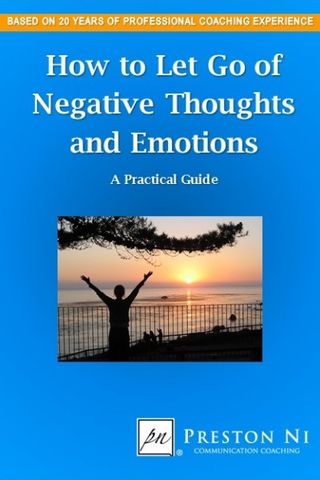Emotional Intelligence
Five Keys to Enhancing Your Emotional Intelligence
Ninety Percent of High Performers Possess High EQ
Posted January 25, 2012

Emotional Intelligence (EQ or EI) can be defined as the ability to understand, manage, and effectively express one's own feelings, as well as engage and navigate successfully with those of others. According to Talent Smart, 90% of high performers at the workplace possess high EQ, while 80% of low performers have low EQ. Emotional Intelligence is absolutely essential in the formation, development, maintenance, and enhancement of close personal relationships. Unlike IQ, which does not change significantly over a lifetime, our EQ can evolve and increase with our desire to learn and grow.
Below are five keys to quickly improve one's emotional intelligence, with references from my books (click on titles): "How to Let Go of Negative Thoughts and Emotions" and "Are You Highly Sensitive? How to Gain Immunity, Peace, and Self-Mastery!".
1. The ability to deal with one's own negative emotions
"We become what we think about all day long." - Ralph Waldo Emerson
Perhaps no aspect of EQ is more important than our ability to effectively manage our own negative emotions, so they don't overwhelm us and affect our judgment. In order to change the way we feel about a situation, we must first change the way we think about it. Here are just two examples:
A. Reducing Negative Personalization. When you feel adversely about someone’s behavior, avoid jumping to a negative conclusion right away. Instead, come up with multiple ways of viewing the situation before reacting. For example, I may be tempted to think my friend didn’t return my call because she’s ignoring me, or I can consider the possibility that she’s been very busy. When we avoid personalizing other people's behaviors, we can perceive their expressions more objectively. People do what they do because of them more than because of us. Widening our perspective can reduce the possibility of misunderstanding.
B. Reducing the Fear of Rejection. One effective way to manage your fear of rejection is to provide yourself with multiple options in important situations, so that no matter what happens, you have strong alternatives going forward. Avoid putting all of your eggs in one basket (emotionally) by identifying a viable Plan B, and also a Plan C, should Plan A not work out. For example:
Increased fear of rejection: “I’m applying for my dream job. I’ll be devastated if they don’t hire me.”
Decreased fear of rejection: “I’m applying for three exciting positions. If one doesn’t pan out, there are two more I’m well qualified for.”
2. The ability to stay cool under pressure
Most of us experience some level of stress in life. How we handle pressure situations can make the difference between being poised versus frazzled. Here are some quick tips:
A. If you feel nervous and anxious, put cold water on your face and get some fresh air. Cool temperature can help reduce our anxiety level. Avoid caffeinated beverages which can stimulate your nervousness.
B. If you feel fearful, depressed, or discouraged, try intense aerobic exercises. Energize yourself. The way we use our body affects greatly the way we feel. As the saying goes - motion dictates emotion. As you experience the vitality of your body, your confidence will also grow.
C. If you feel overwhelmed, confused, stuck, or uninspired, go outdoors and clear your head. Go into nature and surround yourself in colors of

green and blue, which have a calming effect. Find a panoramic view and look out into the distance. Walk. Take deep breaths. Empty your mind. Come back with a fresh perspective.
3. The ability to stay proactive, not reactive in the face of a difficult person
Most of us encounter unreasonable people in our lives. We may be “stuck” with a difficult individual at work or at home. It’s easy to let a challenging person affect us and ruin our day. What are some of the keys to staying proactive in such situations? Here are three quick tips:
A. When you feel angry and upset with someone, before you say something you might later regret, take a deep breath and count slowly to ten. In most circumstances, by the time you reach ten, you would have figured out a better way of communicating the issue, so that you can reduce, instead of complicate the problem. If you're still upset after counting to ten, take a time out if possible, and revisit the issue after you calm down.
B. Another way to reduce reactivity is to try to put yourself in the difficult individual’s shoes, even for just a moment. For example, consider the person you’re dealing with, and complete the sentence: “It must not be easy….”
“My child is being so resistant. It must not be easy to deal with his school and social pressures…”
“My boss is really demanding. It must not be easy to have such high expectations placed on her performance by management…”
To be sure, empathetic statements do not excuse unacceptable behavior. The point is to remind yourself that people do what they do because of their own issues. As long as we’re being reasonable and considerate, difficult behaviors from others say a lot more about them than they do about us. By de-personalizing, we can view the situation more objectively, and come up with better ways of solving the problem.
C. Set Consequence. The ability to identify and assert consequence(s) is one of the most important skills you can use to "stand down" a difficult person. Effectively articulated, consequence gives pause to the difficult individual and compels her or him to shift from violation to respect. In my book (click on title) “How to Communicate Effectively and Handle People,” consequence is presented as seven different types of power you can utilize to affect positive change.
D. Seek clarification when needed. If necessary, inquire with the other person for clarification on why she's behaving the way she does. Ask opened ended questions such as: "I'm just curious, can you tell me why...," and avoid accusations and judgments. Compare that person's words with body language and behavior to check for congruency.
4. The ability to be assertive and express difficult emotions when necessary
"Being who we are requires that we can talk openly about things that are important to us, that we take a clear position on where we stand on important emotional issues, and that we clarify the limits of what is acceptable and tolerable to us in a relationship." - Harriet Lerner
There are times in all of our lives when it's important to set our boundaries appropriately, so people know where we stand. These can include exercising our right to disagree (without being disagreeable), saying "no" without feeling guilty, setting our own priorities, getting what we paid for, and protecting ourselves from duress and harm.
One method to consider when needing to express difficult emotions is the XYZ technique - I feel X when you do Y in situation Z. Here are some examples:
"I feel strongly that I should receive recognition from the company based on my contributions."
"I feel uncomfortable that you expect me to help you over my own priorities."
"I feel disappointed when you didn't follow through when you told me you would."
"I feel frustrated when you continue to not take our finances seriously."
"I felt hurt when you made fun of me at dinner last night."
Avoid using sentences that begin with "you" and followed by accusation or judgment, such as "you are...," "you should...," or "you need to...." "You" language followed by such directives put the listener on the defensive, and make them less likely to be open to what you have to say.
5. The ability to express intimate emotions in close, personal relationships
"We live in the shelter of each other."- Celtic saying
The ability to effectively express and validate tender, loving emotions is essential to maintaining close personal relationships. In this case, "effective" means sharing intimate feelings with someone in an appropriate relationship, in a manner that's nourishing and constructive, and being able to respond affirmatively when the other person does the same.
A person's "heart withers if it does not answer another heart."
- Pearl Buck

Psychologist Dr. John Gottman calls the expression of intimate emotions "bidding." Bidding can be any method of positive connection between two people desiring a close relationship. For example:
Verbal bidding: "How are you doing?" "How are you feeling?" "I love you." "I appreciate you." "I like it when we talk like this." "I'm glad we're spending this time together." "you're such a good friend." "I'm sorry."
Body language bidding: positive eye contact, hugging, smiling, patting the elbow, arm around the shoulder.
Behavioral bidding: offering food or beverage, a personalized card, a thoughtful gift, a needed favor. Empathetic listing. Engaging in shared activities that create a closer bond.
Dr. Gottman's research reveals that close, healthy relationships bid with each other in ways large and small up to hundreds of times a day. The words and gestures can be a million variations, all of which say, in essence, "I care about you," "I want to be connected with you," and "you're important in my life." Constant and consistent bidding is crucial in the maintenance and development of close, personal relationships. It's the vitamin of love.

For more tips on how to increase emotional intelligence, see my books (click on titles):
"How to Let Go of Negative Thoughts and Emotions"
"Are You Highly Sensitive? How to Gain Immunity, Peace, and Self-Mastery!"
"7 Keys to Long-Term Relationship Success"
Follow me on Twitter and Facebook!
© 2012, 2014 by Preston C. Ni. All rights reserved worldwide. Copyright violation may subject the violator to legal prosecution.




